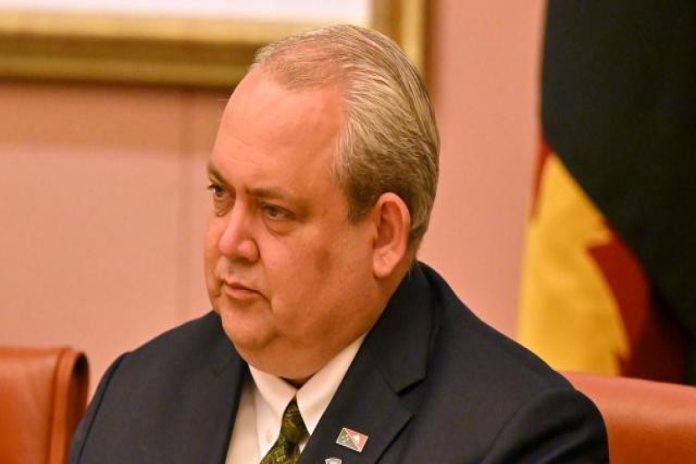Papua New Guinea’s foreign minister has reaffirmed close security ties with Australia following a report that the Pacific island country – recently rocked by riots and looting – was considering a policing and security cooperation agreement with China.
Justin Tkatchenko, who temporarily stepped aside as foreign minister last year after calling some Papua New Guineans “primitive animals,” said Tuesday in a statement that the Pacific island country will maintain its relationship with Australia – “our closest neighbor and a traditional security partner.”
The day before, Tkatchenko said in an interview that Beijing had offered policing and security assistance in September last year. Discussions had continued and the offer was being considered, including whether it would duplicate existing Australian and U.S assistance, he said.
Tkatchenko’s statement lauds Papua New Guinea’s long relationship with Australia, which was the Pacific country’s former colonial power, but doesn’t deny his reported comments of ongoing security talks with China. The comments were a departure from Papua New Guinea’s usual stance that it wants only expanded economic ties with China.
“PNG is proud of its long-term agreement with traditional partners like Australia and will continue to maintain that bilateral relationship, “ the statement said. “Minister Tkatchenko made these remarks to put on record PNG’s ongoing partnership with Australia in the area of security following reports of a potential security deal with China.”
Australia and the United States have both recently signed security cooperation agreements with Papua New Guinea, a response to China’s inroads with Pacific island nations.
Beijing has courted Pacific island nations for several decades with loans for infrastructure and aid as it seeks to isolate Taiwan diplomatically and gain allies in international institutions.
It has notched up diplomatic wins in the past several years, mostly recently this month when Nauru, a Pacific island nation of 10,000 people, severed ties with Taiwan and established diplomatic relations with China. The Solomon Islands and Kiribati switched their diplomatic recognition to China from Taiwan in 2019.
A secretive security cooperation agreement between China and the Solomon Islands, signed in 2022, particularly galvanized renewed U.S interest in Pacific island nations.
Former Papua New Guinea Prime Minister Peter O’Neill said he was “deeply concerned” by reports of a security deal with China and accused leader James Marape of using the recent riots as pretext to further an authoritarian agenda.
“Marape and the Foreign Minister must pull back from these dangerous developments,” he said in a statement on Tuesday.
“Australia shares the Pacific’s geographic place in the world, and we value each other’s democratic and human rights principles.”
Papua New Guinea’s capital Port Moresby was engulfed by chaos on 10 January after its police stopped work to protest a cut in the pay of government employees that was purportedly caused by a payroll system glitch.
Some 16 people died in the city, police said, during looting and arson that damaged an economy already struggling to provide sufficient jobs and basic services.
Papua New Guinea is the most populous Pacific island country with an estimated 12 million people and endowed with significant mineral and other resources. But it has struggled to develop economically because of corruption, poor infrastructure, frequent tribal violence and deep inequality for women.
It has one police officer for about every 1,800 people, nearly four times less than the level recommended by the United Nations to ensure law and order, according to a Griffith Asia Institute report released last year.
Australia’s security agreement with Papua New Guinea, signed in December, is accompanied by a pledge of AUD200 million (US $131 million) in support of Papua New Guinea’s national security priorities that include a larger police force.
With Australia’s assistance, Papua New Guinea will set up a Port Moresby-based police training center with the aim of enabling the Pacific island country to recruit and train more officers.
Tkatchenko, who was reinstated as foreign minister in a January Cabinet reshuffle that followed the riots, said he wanted to emphasise the importance of implementing the security agreement with Australia and promised his department’s cooperation.
“This is to ensure that successful outcomes are achieved and maintained for a long-term relationship between both countries,” he said.
SOURCE: BENAR NEWS/PACNEWS













